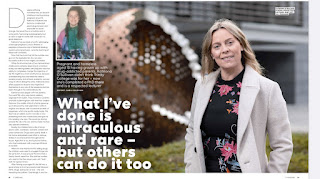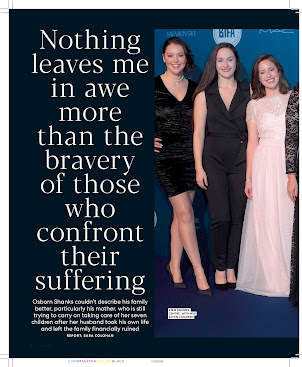Poor by Katriona O Sullivan feature, The Mail.
Katriona O Sullivan’s memoir Poor is getting rave reviews, not least for its unflinching honesty. She chats to us about her incredible story.
Despite suffering homelessness, an abusive childhood, and becoming pregnant at just 15, Katriona O'Sullivan has become a respected psychology lecturer and advocate for social change. Her latest book, Poor has hit the bestseller list. We meet her at home in Dublin to chat about her past, her current success, and her future plans.
Katriona’s book Poor is a truthful and, in some parts, harrowing autobiography, but to call it a rags-to-riches tale would do it a great disservice. O'Sullivan has survived an abusive childhood, a teenage pregnancy, and a lifetime of prejudice to become one of Ireland’s leading, award winning lecturers, currently lecturing at Manyooth University. Now that her book Poor has hit the (number one spot on the) best seller list this month (CHECK ITS POSITION ON PRINT WEEK) she can add best-selling author to her mighty accolades.
While the shocking tale of her impoverished childhood is certainly deserving of a mention today, her lifelong battle with prejudice and her ability to completely change the trajectory of her life might be a more worthy focus, because understanding how she beat the odds to escape poverty and achieve academic success is key to others doing the same. Katriona’s story,Poor, offers support to anyone who might find themselves in any one of the situations she found herself in through her extraordinary life.
Katriona’s story began with her parents, Tony and Tilly, who were heroin addicts originally from Dublin. They moved to Coventry and later moved to Birmingham with their five children. Katriona, the middle of five kids growing up in dire poverty, was offered a life of neglect and abuse, with occasional pockets of happiness, which she recalls vividly today. “My dad was an addict, but he was also a very endearing man who loved books and got me into reading. We would go driving around the city in his car, and he made me feel very special sometimes.”
Mostly, the children lived a life of social service visits, overdoses, warrants, arrests, and prison sentences. In 1998, a 20-year-old Katriona moved to Dublin, and after a few lost years trying to find her way, she, by chance, came across the Trinity College Access Programme. She enrolled and went on to complete a PHD in psychology, staying on to join the Trinity College staff as a lecturer. She’s now a senior lecturer in Digital Skills at Maynooth University.
She knows luck had a big part to play in her not only surviving but thriving because she believes the system is not built to support poor people trying to better themselves. “What I’ve done is miraculous and rare, because we don’t have investment. If I were in that situation now, I wouldn’t be here.” The individual, she said recently in The Guardian, “is small in the decisions of their life, and we don’t like that because it suggests we’re powerless. But choice is a myth that’s perpetuated by the middle classes—only a few people really can choose.”
Luck and a couple of observant teachers early on, Ms. Arkinson taught her how to wash and groom herself, and later in secondary school, Mr. Pickering saw her intellectual potential and went out of his way to get her through the basic education system. Sadly, Mr. Pickering died before she had a chance to share her success story with him, but she tracked Ms. Arkinson down on Facebook and got the chance to thank her.
As we chat, the only trace of her Coventry and Birmingham past is in her accent, which changes from a mix of Dublin to Birmingham, each accent getting a little stronger depending on which time in her life she’s speaking about.
First, I ask her how she is coping with the great reception for her book Poor and how cathartic writing such a personal and difficult book has been for her mental health.
It has been hard at times, the outpouring of love and kindness has been wonderful, but I definitely feel vulnerable at times and worried that people will not understand the point of Poor. Writing my memoir was healing for sure, and it helped me reclaim myself, my younger self, and to see my mum in different ways. When people have experienced trauma it can be difficult to enjoy the moment and I am working hard to do this.
You tell us in Poor that in one university, a student thought you were the cleaner rather than their new lecturer. You laughed it off and silenced them all by giving a blindingly good lecture, but for a lot of people who enter a world where they weren’t expected to thrive, imposter syndrome can rear its head. How do you overcome niggling insecurities and triggers to keep going?
I have a wonderful support system who just think I am deadly! I have been in therapy for years and have a husband who supports me fully. When I doubt myself I turn to them for support. I don’t think it is a syndrome, sometimes we are imposters, I think it is important to name this- if the person feels they can, and if not, there are some self-care activities I do which help. I write and record my feelings, I talk to friends who can relate- I head to the sea to swim. It isn’t always easy but it has been worthwhile to push through.
The Trinity Access Programme was a key experience for you; what programmes are out there now for people, and how would you advise anyone struggling with their life’s direction?
It depends where they are in their lives. For women and mothers there are loads of community programmes they could reach out to for guidance- the women's sheds, the women's collective, An Cosan- there are so many places which are in the community to support women into and through education. In universities there are access offices which can provide guidance to people thinking of going to college- every university has them and they can be a great help. Or the mature student officer in universities can be great too. Right not there are so many jobs in tech and trainings in tech for women, the Women in Tech projects run through FIT are great. Most people in education will try to help a person to find their path so I would advise them to send emails and ask questions. If they cant send emails then call places.
What gets you motivated and inspired these days, and what’s next for you in your busy life?
I love my job! I get to help other girls like me in education through the programme I run called the STEM Passport for Inclusion -which is a privilege. I am also a bit of a geek- I love research and I love contributing to the academic world- these things motivate me work wise. I have 3 kids and a beautiful grandson who get me out of bed each day- one of my sons is sitting the Leaving Cert soon, so we are pretty focused on him tight now. I still read a lot and I love holidays!
Poor is available nationwide



Comments